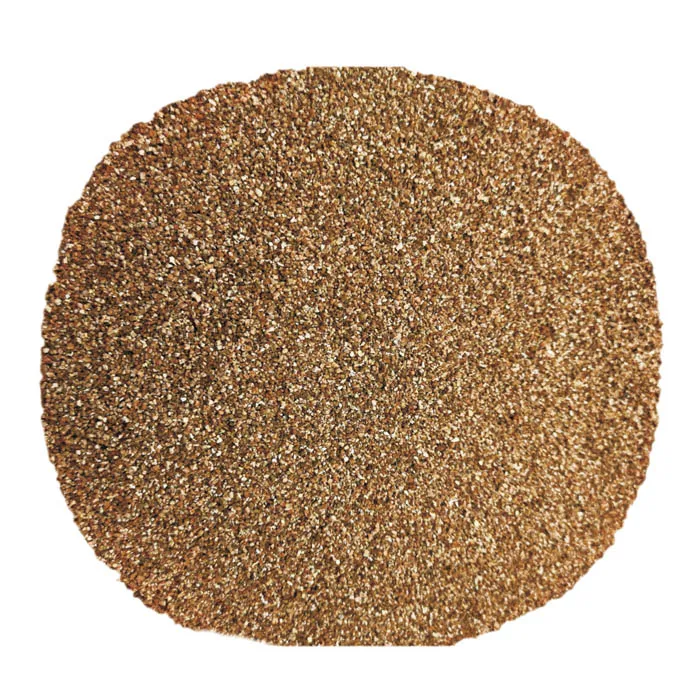jun . 25, 2025 15:46 Povratak na listu
Revolutionize Manufacturing and Gardening with Advanced Metallurgical and Soil Materials
Modern industry and agriculture increasingly rely on specialized materials to enhance performance, efficiency, and yield. In both heavy manufacturing and home gardening, choosing the right substances can make a measurable difference in outcomes. From metallurgical material used in steel production to soil-enhancing minerals like vermiculite, each plays a unique role in achieving operational excellence or greener, more vibrant gardens. Understanding their applications, sourcing methods, and benefits can help businesses and individuals make more informed decisions, whether they're fabricating alloys or cultivating healthy plants.

Choosing the Right Supplier Among Leading Metallurgical Material Factories
To ensure consistent product quality and operational stability, businesses must collaborate with reputable metallurgical material factories that offer high-purity components and consistent particle sizing. These factories often produce ferroalloys, graphite-based additives, and desulfurization agents vital to steel, iron, and aluminum refining processes. Leading metallurgical material factories not only maintain strict quality control but also offer tailored compositions based on customer requirements. These specialized inputs contribute to uniform metal structure, improved mechanical strength, and reduced casting defects — essential advantages for manufacturers striving for excellence in highly competitive sectors.
Boosting Steel Quality with High-Efficiency Carbon Raiser Additives
In metallurgy, the strategic use of carbon raiser can dramatically impact the outcome of smelting and casting operations. Commonly derived from calcined petroleum coke or graphite, the carbon raiser is a crucial agent that increases carbon content in molten metal. By adding it at specific stages in the production cycle, manufacturers enhance metal hardness, tensile strength, and machinability. Whether in steelmaking, foundries, or ductile iron processes, the proper grade of carbon additive ensures reduced slag formation and optimized melt chemistry, lowering overall production costs while maintaining high-quality standards.
Enhancing Plant Growth Naturally with Garden Vermiculite for Water Retention
Beyond metallurgy, natural minerals like garden vermiculite provide transformative benefits in horticulture. This lightweight, absorbent material expands when heated, forming sterile, sponge-like particles that improve soil aeration and moisture retention. Garden vermiculite is especially valuable in seed starting mixes, potted plants, and vegetable gardens where water management is crucial. By holding moisture close to roots and releasing it gradually, it promotes even germination and robust growth. Its neutral pH and non-toxic properties make it an excellent choice for organic gardening practices focused on sustainability and chemical-free cultivation.
Increasing Soil Efficiency Using Potting Soil Vermiculite for Container Plants
Indoor and container gardeners often turn to potting soil vermiculite to enhance their growing media. When blended into commercial or homemade potting mixes, this mineral boosts drainage while maintaining essential hydration. Potting soil vermiculite also plays a vital role in nutrient retention, helping slow the leaching of fertilizers and increasing their availability to plants. The result is stronger root systems, healthier foliage, and more vigorous blooms or fruiting. Its compatibility with perlite and peat moss also allows growers to customize their soil mixes to specific plant needs, from tropical ferns to flowering annuals.
What Are the Key Benefits of Choosing High-Grade Metallurgical Materials?
Superior metallurgical material quality contributes to better casting fluidity, reduced gas content, and enhanced metallurgical bonding. This results in finished products with improved mechanical performance, minimized waste, and fewer returns or failures.
How Does Carbon Raiser Contribute to Energy Efficiency in Foundries?
By optimizing the carbon content in molten metal, carbon raiser shortens processing times and lowers energy consumption. Its efficient absorption also reduces the need for secondary refining, streamlining overall production cycles.
Can Vermiculite Be Reused in Gardening After a Growing Season?
Yes, both garden vermiculite and potting soil vermiculite can be reused, especially when sterilized between uses. They retain structure and water-holding capacity across seasons, offering gardeners long-term value and reduced media replacement costs.
What Is the Difference Between Vermiculite and Perlite in Soil Mixes?
While both improve aeration, vermiculite retains more water than perlite, making it ideal for plants that prefer consistent moisture. Perlite, being more porous, is better for cacti or succulents that require faster drainage.
Metallurgical and Vermiculite Material FAQs
Q: What industries typically use metallurgical material in large volumes?
A: Foundries, steel mills, aluminum smelters, and non-ferrous metal refiners are the primary users. Automotive, aerospace, and infrastructure sectors also rely on high-quality metallurgical material for component durability.
Q: How should carbon raiser be stored to preserve its effectiveness?
A: It should be stored in dry, cool conditions away from moisture and direct sunlight. Sealed packaging helps maintain carbon content and prevents contamination.
Q: Is garden vermiculite environmentally safe for all types of plants?
A: Yes, garden vermiculite is chemically inert and safe for all plant types. It contains no added chemicals, making it ideal for organic farming and eco-conscious gardeners.
Q: How much potting soil vermiculite should be mixed into a standard soil blend?
A: A typical mix includes 25–30% potting soil vermiculite, depending on plant needs. Adjust based on whether moisture retention or drainage is the top priority.
Q: Are metallurgical material factories able to customize product grades?
A: Yes, many metallurgical material factories offer customization for grain size, carbon content, or purity level to suit specific industrial applications.
-
Strength with Premium Steel and Calcined Bauxite
VijestiJul.28,2025
-
Revolutionize Construction Efficiency with Smart Industrial Materials
VijestiJul.28,2025
-
Redefined with High-Grade Iron Powder Solutions
VijestiJul.28,2025
-
Metallurgical Efficiency with Innovative Recarburisers and Covering Agents
VijestiJul.28,2025
-
Industrial Efficiency Enhanced with High-Performance Recarburizer Solutions
VijestiJul.28,2025
-
Boosted by Advanced Iron Powder and Carbon Additive Solutions
VijestiJul.28,2025
